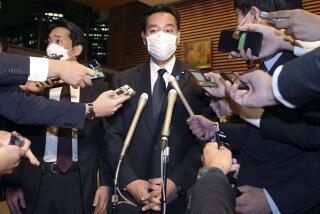Coalition Activist Says Japan Should Apologize for WWII : Foreign policy: Move is needed to dispel suspicion that nation seeks military dominance, Hata says.
- Share via
TOKYO — Japan’s next government should clearly apologize for World War II and “inform our children what their forefathers did in the past,” Tsutomu Hata, who is expected to become the country’s deputy prime minister, said Tuesday.
Such action is needed, he said, to end constant foreign demands for apologies and continuing suspicion that Japan is bent on seeking military dominance again in Asia.
Hata, 57, is a leading figure in the eight-party coalition that is expected to begin governing Japan when Parliament elects a prime minister Thursday. He heads the Renewal Party, a band of rebels from the outgoing Liberal Democratic Party, and served as finance minister under outgoing Prime Minister Kiichi Miyazawa until last December.
Hata made the extraordinary statements at the Foreign Correspondents Club of Japan in response to a question about a pledge in the coalition’s platform to “self-reflect on the past war.” The Liberal Democrat governments that ruled Japan for 38 years consistently resisted recognizing Japan’s responsibility for World War II.
Although he himself was touted for the prime minister job after Japan’s perennial rulers failed to win a majority in the lower house in the July 18 election, Hata said he now intends to act as the “glue” to hold the coalition parties together under the premiership of Morihiro Hosokawa. A fellow Liberal Democrat defector who established the grass-roots Japan New Party only 14 months ago, Hosokawa is the expected victor when Parliament votes on the top post Thursday.
Hata revealed that he had recommended to Miyazawa in 1991 that the prime minister issue a war apology and that Parliament enact a resolution backing him up shortly before the United States marked the 50th anniversary of the Japanese attack on Pearl Harbor. Opposition from right-wing Liberal Democrats, however, squelched the move.
Now, the approaching 50th anniversary of Japan’s 1945 defeat offers another occasion for a “soul-searching look at the meaning of the war,” he said.
Hata complained that every time Japan’s emperor goes overseas or foreign royalty comes to Japan, comments on Japan’s role in World War II become an issue.
“How long can this phenomenon continue?” he said. To end the trouble, Japan should offer a clear war apology, instead of “using such words as ‘regret,’ ” he said.
He added that the Japanese should stop using the word shusen (end of the war) and start saying haisen (defeat in the war), “because that was what it was. We must also inform our children what their forefathers did in the past.”
“To Asia and to the rest of the world, we should clearly apologize for things for which an apology is needed and come to grips with what happened in the past,” he said.
Apologies “are needed at home too,” Hata added, citing Japanese victims of atomic and other bombings of major cities during the war, children who were orphaned and Japanese settlers in Manchuria who were abandoned by Japan’s armed forces at the end of the war.
Hata also said Japan should drop its habit of merely “following the United States” in its foreign policy.
Meanwhile, Takako Doi, former chairwoman of Japan’s Socialist Party, accepted a coalition offer to serve as Speaker of the lower house. The first woman ever to head a major party in Japan, she will now become the first woman to serve as Speaker.
More to Read
Sign up for Essential California
The most important California stories and recommendations in your inbox every morning.
You may occasionally receive promotional content from the Los Angeles Times.












